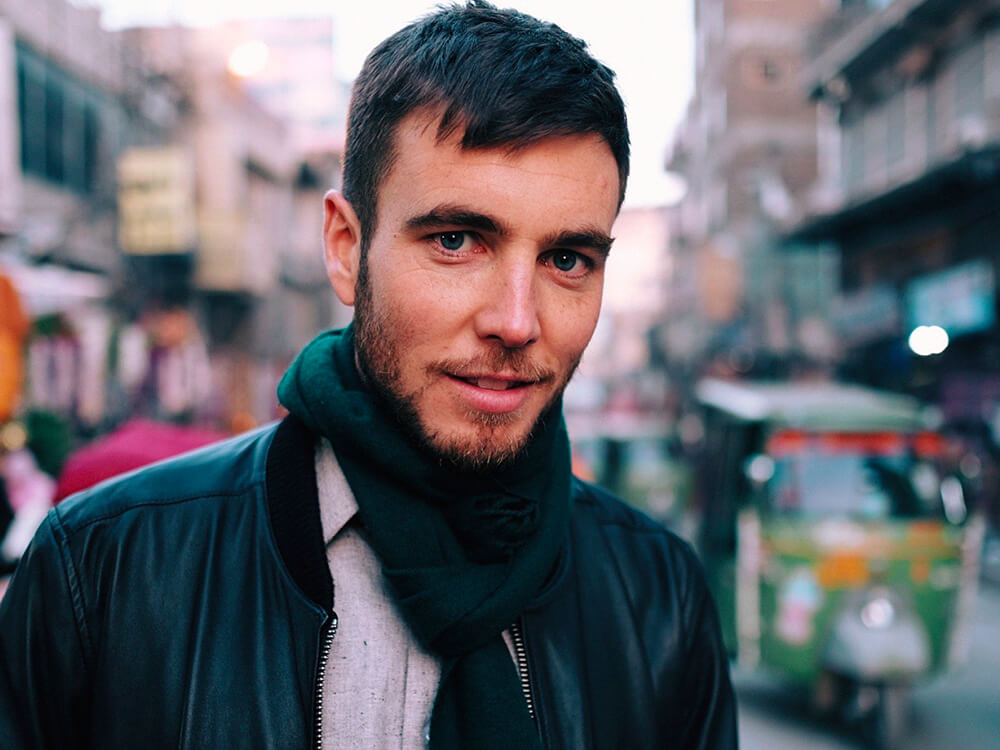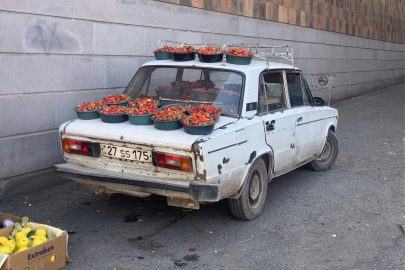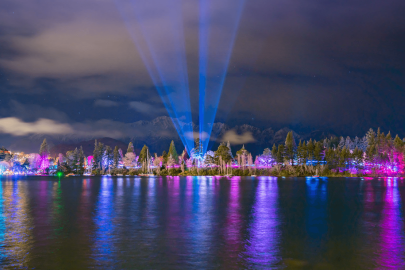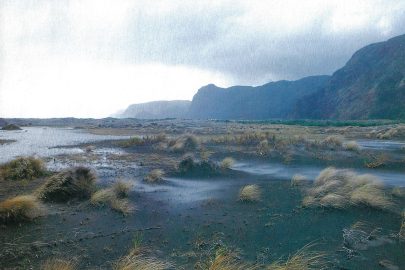Apr 3, 2020 Travel
In Pakistan, the locals are preposterously hospitable, a Kalashnikov is just $300 and everyone loves Martin Guptill.
The flatbed just clipped us. A peck on the nose. Not enough to spin us or flip us, but enough to send our tuk-tuk driver into a fury. He pulled up to the truck at the next traffic lights, slapped the driver’s door, and started screaming in Urdu. The driver just smirked.
Of course the driving in South Asia is everything you expect — frenzied — except maybe a little worse. Vehicles straddle multiple lanes for no obvious reason. Stop signs and red lights generally serve only a decorative function, and many drivers treat their horns as crude echo-location systems. Once, our car was pulled over and our driver fined for doing 89km/h in a 50km/h zone. Our man laughed, back-slapped the policeman, paid the fine in cash, and accelerated away at a speed I’d guess was almost exactly 89km/h.
On this occasion though, the tuk-tuk driver was seriously pissed off. He cursed and spat, and as we waited at the lights, he squeezed the nose of our tuk-tuk back in front of the flatbed so the truck couldn’t move forward. The light went green, the traffic on both sides accelerated out, and the flatbed was boxed in behind us.
Our driver waited. And waited. And then he growled forward, slowly, twisting side-to-side like a match-racing skipper, deliberately frustrating the flatbed behind us. As soon as the flatbed driver found a gap in the traffic on his left, he swung his truck into the space, accelerated, and then tried to drop his truck back in front of our vehicle to block us in the same way we’d blocked him. But he got it wrong. He accelerated way too hard and spun out right across our lane into the next one over, putting the flatbed perpendicular to the speeding traffic on our right-hand side, with his door flush against the stream of oncoming cars. Boompha. Our tuk-tuk driver weaved through the mess and gassed it into the Karachi night.
That was probably the closest my brother Frank and I came to death in Pakistan. We had done our research before we travelled; avoided areas with Taliban sympathies; wore local threads; travelled with a doorstop and used the deadbolt in our hotels. We read the news and we didn’t push our luck. We avoided western Balochistan. We didn’t accidentally stray into Pakistani Kashmir or nip across the Khyber Pass into Afghanistan for a long weekend. When Qasem Soleimani was assassinated in an American drone strike, we saw a few amateur posters glued up in Rawalpindi calling him a shahid (martyr) and vowing revenge. An official banner just down the road said, “Pakistan: A Peaceful Country”. 100% Pure.

We found Pakistanis almost preposterously hospitable. A tuk-tuk driver in Rawalpindi, whose annual earnings we probably match with a couple of days’ of work in New Zealand, tried to refuse our measly fare after collecting us from the railway station. “Please,” he said, “you are guests in our country.”
The same thing happened at a suburban restaurant, where we ate a big chicken biryani and four deep-fried lentil-and-beef patties with raw onion and chutney. Sizzling bliss on the sidewalk. “Please, no,” said the owner. “You are guests in our country.”
To feel guilty and humbled at once.
When there’s a good chance you’ll be shitting in some unfamiliar holes, it’s good to travel with someone who has your back. I’m lucky to have my brother and we’re into the same stuff. Last year we did a month in the Middle East. Latin America in the years before that. Nothing too extreme. We’re drawn to modern history, geopolitics, and food. We like to feel away when we go away. Political tension? A complicated modern conflict history? Amoebas? Sign us up. Frank’s come to enjoy the taste of rehydration salts.
We started in the Punjab, crossing from Amritsar in India over the Wagah border into Lahore. It was the front line of Partition. The bloody line in the sand. In 1947, when the Brits upped sticks and moved out, between one and two million people were savaged and killed in a few months. Rape, butchery, infanticide: Partition was top of the pops in human barbarity. Today, people live on either side of the border, only a few dozen kilometres from their ancestral homes, knowing they’ll most likely never cross again. If they want to get close, they can visit the nightly Wagah border ceremony, where army officers from each country face off, huffing and puffing and silly-walking and stomping, before they lower the flags and slam the gate shut. On the Indian side, they built a stadium for locals to come and cheer on the border guards. They pumped up the crowd with “Jai Ho!” Pakistan gets by with a more modest set-up: a few tiers of uncovered seats and no speakers blasting the Pussycat Dolls. The whole thing is camp, but it’s tribal. Muslims to the left. Hindus and Sikhs to the right. On the count of three, everyone say “Hate!”
There were maybe 20 of us wanting to cross the border but when we arrived the system was down. It took an hour or two to fix it and we sat in the dark waiting.
A gregarious Sikh family pulled in next to us. “Are you from New Zealand?” the mother asked. “Yes!” I said. “How did you know?” “We live in Upper Hutt.” Sweet as.
When the computers came right, the Pakistanis in the room were told to sit and wait for everyone else to go first.
Lahore is special. We stayed in a hotel with concrete trellises covering the windows and a small army of guards with Kalashnikovs and pump-action shotguns. Everyone loved Martin Guptill. Inside, it was opulent; outside, the air pollution was several times the safe level. We hit a market, where a beggar with a monstrous leg infection dragged himself around while women shopped for refulgent wedding garb. We walked to Gaddafi Stadium (yep, that Gaddafi), outside which, 11 years ago, the Sri Lankan cricket team’s bus was attacked by terrorists, all but ending international cricket in Pakistan. In the field across the road, boys practised in the nets by a pitch with an old rope boundary. We lay down and savoured the babble of cricket in fading light.
Cricket is everywhere in Pakistan. By a gate to Lahore’s walled city, I photographed school boys in dirtied shalwar kameez as they bashed each other’s bowling around an empty concrete lot. They had stacked a few bricks and old rocks to use as wickets. Few of them had learnt how to bowl and so simply chucked the ball instead. There were no girls and no defensive shots; every couple of minutes a tuk-tuk driver outside would be startled by an errant ball falling from the sky and bouncing across the road. One game ended when the boys hit the ball in a sewer. Everyone loved Martin Guptill.

Lahore really is special. The walled city is darkness and light. Lethargy and pep. Beguilement. Hot tandoor bread, clattering bangles, dazzling wedding dresses and death-row chickens. Noise and quiet, puddles and smut. I photographed a man with a henna-dyed beard and a bad eye. A woman in niqab looked at me and turned away fast. Squatting men shared food from a large cooking pot outside their sandal shop. Everyone loved Martin Guptill.
The lanes open up to Lahore’s magnificent Badshahi Mosque, whose courtyard can hold 100,000 people. Red sandstone and marble. Square lines and domes. Glory. Give me a grand mosque over a cathedral any day; Mughal architecture is mathematics in brick. We got confused and entered through a side door with an excited wedding party, always so clean in the dust.
Lahore has some wealth. Recreational cyclists wear Lycra and cappuccinos are served in coffee shops where they roast their own beans. We Ubered out into the suburbs where a developer built a replica Eiffel Tower as a centrepiece for a new town. In Rawalpindi, we visited the same developer’s Statue of Liberty. Death to the west? Not so much.
Pindi and Islamabad are sister cities and contrast each other by design. Chaos and order. In Rawalpindi we wanted to see the park where Benazir Bhutto was assassinated. It was grim. We visited the park where her father was hanged in the old jail. Moderately less grim. Bazaars curled about at all angles. We hit cakes and ice creams and lassi, thick as chowder, ladled out smooth from foaming cauldrons. Dry societies always have good sweets. We came to a bazaar which specialised in equipment for disabled people. Some of the shops had stairs. I got a haircut and the guy cleaned up my neck with a cutthroat razor, pausing for each delivery of a Big Bash T20 game on his scratchy TV. In a gun shop, I inquired as to the cost of a Pakistani-made Kalashnikov. About $300. Very reasonable. At the Pakistan Army Museum, we read the grand displays on various celebrated Pakistani shahid. The gallery dedicated to the fight against terrorism didn’t mention the raid on bin Laden’s Abbottabad hideout.

Islamabad is sometimes compared to Canberra. It’s a measured capital. Formal. Deliberately inorganic. There are grids and zones. Wide streets and nice houses. Foreign diplomats can eat sushi or Spanish tapas if they leave their compounds. In the middle of town we sat under an umbrella and ordered tandoor chicken rolled tight in fresh parathas. Superlative. The waiter fed scraps of kindling into a fire in an old paint can. At the Metrobus stop closest to the embassy enclave, a massive banner said ‘STAND WITH KASHMIR.’
We’d hoped to go north into the mountains, up the Karakoram Highway in the shadow of some of the biggest mountains on Earth. Pakistan’s best scenery can make the Southern Alps blush. You can go all the way to the border with Western China, where a Pakistani bank boasts of having installed the world’s highest ATM. When we arrived at the airport though, the weather was ropey. With all the snow in winter, the delays up north can last days. We waited five hours for the ping-pong-ladies-and-gentlemen call of death. Next time.
Instead we ended our trip in Karachi. Hard work in the heat, but in winter just fine. If the North of Pakistan boasts untouched beauty, the south is definitely touched. We joined the masses at the mausoleum where Pakistan’s founder is entombed in marble. Splendid white on white. Outside, Bedford buses with psychedelic paint jobs heaved and groaned, windowless sweat pits with men hanging out the doors. We walked to a Christian cemetery where a local businessman has erected a massive, provocative, 14-storey Christian cross. He boasts the cross is bulletproof. We didn’t hang about to see.
At Clifton Beach on the Arabian Sea, squealing Pakistani families hired dune buggies at low tide, spitting up sand and the abandoned detritus of life. A thin stream of water stretched from some shacks into the filthy shallows. The tang of sewage. Frank mistimed his jump and his sock squelched all afternoon.
Before we left Pakistan, in a park once modelled on Kew Gardens, we were welcomed by men for a last joyous game of cricket. They asked us for team photos, then we cooled off with Peshawari ice cream and cold Coke. We savoured the city’s vigour and drone. The mania. The glistening chickens roasting roadside. We ate rabri from clay bowls, the smooth, sweet condensed-milk gloop spiced with cardamom and pistachios. Our hotel thumped with the sound of another big wedding party. As I waited to check in at Karachi Airport, a man dressed in pure white robes, headed to Mecca, cut in front of me in line.
What privilege it is to get your bearings in someone else’s city. To weave between the 70cc Hondas or share a handrail on the bus. What privilege it is, not just to read of another person’s existence, but to share it for a moment, to rip bread from the same oven and buy oranges from the same cart, to feel the snap of the same barber’s scissors, to choke on the same exhausts. What privilege it is to choose a little discomfort. For what is travel but the pursuit of experience that reminds us we’re alive?
This piece originally appeared in the March-April 2020 issue of Metro magazine, with the headline ‘North of the border’.






